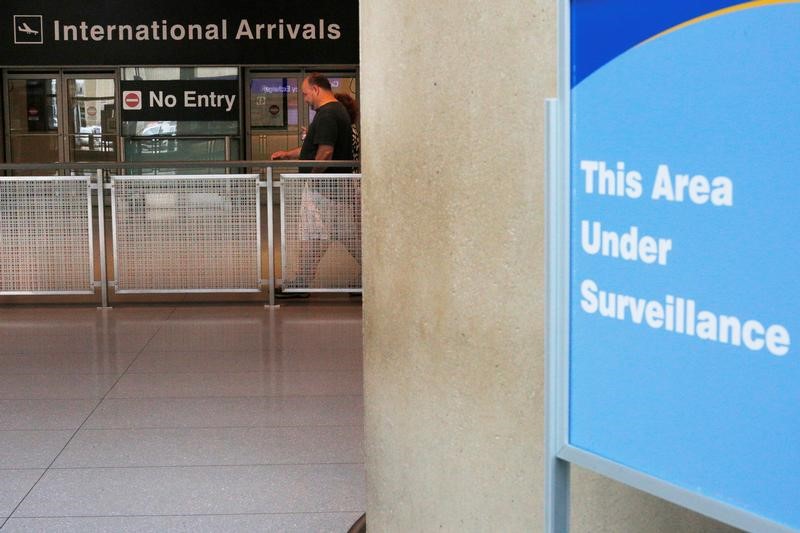Investing.com’s stocks of the week
By Arshad Mohammed and Yeganeh Torbati
WASHINGTON (Reuters) - The White House Domestic Policy Council (DPC) is taking the lead on a decision about how many refugees to admit to the United States next year, two current and three former officials said, a move that may empower those who wish to reduce immigration.
The council, which reports to U.S. President Donald Trump's senior adviser for policy Stephen Miller, an architect of Trump's initial travel ban, is adopting a role traditionally handled by National Security Council and State Department officials.
The shift may strengthen the hand of officials who, like Trump himself, wish to cut the number of refugees resettled in the United States, against foreign policy experts who view the issue through an international humanitarian lens and say taking them in is vital to getting others to keep their borders open.
The bureaucratic maneuver appears to be part of a wider Washington fight over steps that the Trump administration has taken to limit immigration to the United States.
These include two Trump executive orders, both challenged in court, temporarily banning most refugees from entering as well as most visits by citizens of six Muslim-majority nations; an internal debate over the cost of resettling refugees; and a crackdown on illegal immigration.
By law, the president must tell Congress before the Oct. 1 start of the fiscal year how many refugees he believes need to be resettled in the United States in the next year. It is not known how many refugees Trump will decide to admit.
The DPC's enhanced role may reflect a White House tendency to view the issue through a political prism given Trump's focus in his 2016 election campaign on curbing immigration and its popularity with his base, the current and former officials said.
"They see it as continuation of a campaign issue about keeping America safe" rather than as "a humanitarian issue about helping people who were fleeing persecution and war overseas," said one former official who spoke on condition of anonymity.
In his original Jan. 27 executive order, Trump said some people admitted as refugees "have been convicted or implicated in terrorism-related crimes" and called for tighter vetting.
"Deteriorating conditions in certain countries due to war, strife, disaster, and civil unrest increase the likelihood that terrorists will use any means possible to enter," he added.
Critics argue refugees are the most heavily vetted group to come to the United States and highly unlikely to pose a threat.
The White House and State Department did not respond to requests for comment.
Miller was the keynote speaker at a 2015 awards ceremony of the Center for Immigration Studies, a group which aims to limit immigration. DPC member John Zadrozny has worked for the Federation for American Immigration Reform, which seeks to lower immigration to a level that "more closely reflects past policy."
In both his travel ban executive orders, Trump has ordered the United States to accept a maximum of 50,000 refugees for permanent resettlement in the fiscal 2017 year ending Sept. 30, less than half the 110,000 President Barack Obama authorized.
That would be the lowest level of refugee resettlement in the United States since fiscal 2007, when 48,282 were admitted. As of July 21, the United States had taken in 50,334 so far in fiscal 2017, according to official data.
(For a graphic of U.S. refugee admissions see: http://tmsnrt.rs/2h0PQRC)
However, it would track with the original guideline set by the Refugee Act of 1980, which capped admissions at 50,000 for fiscal 1980, 1981 and 1982 unless the president found more were justified on humanitarian or other national interest grounds. From fiscal 1983, the 50,000 cap did not apply.
Proponents argue that the United States needs to take in refugees for many reasons, not least to help make the case to states such as Jordan, Turkey and Lebanon accepting hundreds of thousands of Syrian refugees to keep their borders open.
"There has been so much talk recently of the alleged security implications of letting refugees in, but the administration doesn't seem fully cognizant of the national security implications of keeping refugees out," said Rebecca Heller of the International Refugee Assistance Project, which sued to block Trump's travel ban executive orders.
"Our allies in the Middle East, on whom we depend in the partnership to defeat (the Islamic State group), rely on U.S. refugee resettlement to relieve the strain placed by refugees on their domestic infrastructure," she added.
